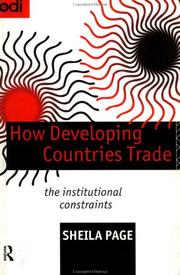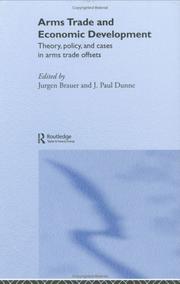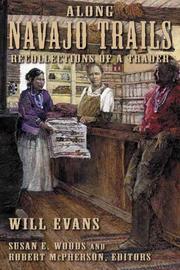| Listing 1 - 10 of 11 | << page >> |
Sort by
|
Book
ISBN: 146962690X 1469626918 9781469626918 9781469626901 9781469628899 1469628899 9781469626895 1469626896 9798890846716 Year: 2016 Publisher: Chapel Hill
Abstract | Keywords | Export | Availability | Bookmark
 Loading...
Loading...Choose an application
- Reference Manager
- EndNote
- RefWorks (Direct export to RefWorks)
"As a fledgling republic, the United States implemented a series of trading outposts to engage indigenous peoples and to expand American interests west of the Appalachian Mountains. Under the authority of the executive branch, this Indian factory system was designed to strengthen economic ties between Indian nations and the United States, while eliminating competition from unscrupulous fur traders. In this detailed history of the Indian factory system, David Andrew Nichols demonstrates how Native Americans and U.S. government authorities sought to exert their power in the trading posts by using them as sites for commerce, political maneuvering, and diplomatic action"--
Trading posts --- Posts, Trading --- Barter --- History.
Book
ISBN: 9780292735545 0292735545 9780292729674 0292729677 9780292754331 0292754337 Year: 2021 Publisher: Austin
Abstract | Keywords | Export | Availability | Bookmark
 Loading...
Loading...Choose an application
- Reference Manager
- EndNote
- RefWorks (Direct export to RefWorks)
Deianeira sends her husband Herakles a poisoned robe. Eriphyle trades the life of her husband Amphiaraos for a golden necklace. Atreus’s wife Aerope gives away the token of his sovereignty, a lamb with a golden fleece, to his brother Thyestes, who has seduced her. Gifts and exchanges always involve a certain risk in any culture, but in the ancient Greek imagination, women and gifts appear to be a particularly deadly combination. This book explores the role of gender in exchange as represented in ancient Greek culture, including Homeric epic and tragedy, non-literary texts, and iconographic and historical evidence of various kinds. Using extensive insights from anthropological work on marriage, kinship, and exchange, as well as ethnographic parallels from other traditional societies, Deborah Lyons probes the gendered division of labor among both gods and mortals, the role of marriage (and its failure) in transforming women from objects to agents of exchange, the equivocal nature of women as exchange-partners, and the importance of the sister-brother bond in understanding the economic and social place of women in ancient Greece. Her findings not only enlarge our understanding of social attitudes and practices in Greek antiquity but also demonstrate the applicability of ethnographic techniques and anthropological theory to the study of ancient societies.
Gifts --- Ceremonial exchange --- Barter --- Sex role --- History. --- Greece --- Social life and customs.
Book
ISBN: 0262279126 0585445230 9780262279123 9780585445236 Year: 2002 Publisher: Cambridge, Mass. : MIT Press,
Abstract | Keywords | Export | Availability | Bookmark
 Loading...
Loading...Choose an application
- Reference Manager
- EndNote
- RefWorks (Direct export to RefWorks)
An institutional approach to explaining countertrade and barter in international trade and domestic trade in transition economies.Difficulties in contract enforcement impede international transactions in the world economy and domestic transactions in transition economies. In Contracts in Trade and Transition, Dalia Marin and Monika Schnitzer explain how barter as an economic institution can facilitate contract enforcement across national borders in international trade and within borders in transition countries. The authors show that international countertrade--tying an export to an import--emerged in the 1980s in response to the international debt crisis when Western creditors refused to finance imports to developing countries and Eastern Europe. Barter--the exchange of goods without the use of money--reemerged in transition economies in the 1990s in response to a domestic debt crisis when banks in transition countries were reluctant to provide finance to firms. Countertrade and barter introduce a deal-specific form of collateral that addresses the lack of creditworthiness of countries and firms.Drawing on contract theory, the authors argue that parties might want to pay in goods rather than cash or link an export with an import as in countertrade to solve incentive problems that otherwise would prevent any trade from taking place. The incentive problems they discuss are the technology transfer problem to developing countries and the "lack of trust" problem in the former Soviet Union.
Barter. --- Countertrade. --- Barter --- Countertrade --- International trade. --- External trade --- Foreign commerce --- Foreign trade --- Global commerce --- Global trade --- Trade, International --- World trade --- Compensation trade --- In-kind exchange --- Payment-in-kind --- Commerce --- International economic relations --- Non-traded goods --- Balance of payments --- East-West trade --- International trade --- Exchange --- Local exchange trading systems --- ECONOMICS/Trade & Development
Book
ISBN: 1003346375 1000915077 1003346375 1000915069 1032387017 1032387025 Year: 2024 Publisher: Milton Park, England : Routledge,
Abstract | Keywords | Export | Availability | Bookmark
 Loading...
Loading...Choose an application
- Reference Manager
- EndNote
- RefWorks (Direct export to RefWorks)
"Pribble investigates the barter economies that developed in many of the labor camps established under the Khmer Rouge in Cambodia. When the Khmer Rouge abolished currency and markets in 1975, starving Cambodians created underground exchanges in labor camps throughout the country, bartering luxury items for food and other necessities, while simultaneously undermining the regime's ideological goals of eliminating any traces of capitalism in Democratic Kampuchea. Pribble asserts three key points about the barter economy in the Khmer Rouge labor camps. First, the underground exchanges in Democratic Kampuchea provided food and medicine for desperate people subsisting under a totalitarian regime, saving the lives of countless Cambodians. Second, bartering was the riskiest way to obtain food because it was dependent upon the discretion of two or more individuals from different social classes under the threat of violent punishment, thereby altering the social dynamics of the camps. Finally, despite the regime's extreme efforts to eliminate foreign influence from the country and impose communist ideology on millions of citizens, basic forms of market capitalism and a demand for superfluous luxury goods persisted in labor camps throughout the country. A fascinating study of the human consequences of imposing rigid ideology, that will be of particular interest to scholars and students of political history and Southeast Asian history"--
Barter. --- Labor camps. --- Political prisoners. --- Political science. --- Cambodia --- Politics and government --- Administration --- Civil government --- Commonwealth, The --- Government --- Political theory --- Political thought --- Politics --- Science, Political --- Social sciences --- State, The --- Prisoners of conscience --- Prisoners --- Camps, Labor --- Construction camps --- Working class --- In-kind exchange --- Payment-in-kind --- Exchange --- Local exchange trading systems --- Dwellings --- Barter --- Labor camps --- Political prisoners --- History.

ISBN: 0415117771 041511778X 0203480023 0203479629 1134816383 1280049375 0429232829 9780203479629 9780415117777 9780415117784 9786610049370 6610049378 9780203480021 9781280049378 9781134816385 9780429232824 9781134816330 9781134816378 1134816375 Year: 1994 Publisher: London New York Routledge
Abstract | Keywords | Export | Availability | Bookmark
 Loading...
Loading...Choose an application
- Reference Manager
- EndNote
- RefWorks (Direct export to RefWorks)
Over the last fifteen years there have been dramatic increases in both private and public intervention in international trade. Traditional barriers to market-based trade such as commodity cartels and tariffs have been augmented by new developments such as the rise of regional trade blocs and the growth of intra-firm trade. This book argues that these changes are large and persistent enough to have an impact on total development performance, and on the performance of individual countries and individual sectors. It illustrates this with a wealth of theoretical arguments, empirical evidence and c
Countertrade. --- Investments. --- Countertrade --- Investments --- Local Commerce --- Commerce --- Business & Economics --- Developing countries --- Commerce. --- Commercial policy. --- Economic conditions. --- Compensation trade --- Balance of payments --- Barter --- East-West trade --- International trade --- Commercial policy --- Economic conditions
Book
ISBN: 0816537860 0816512248 Year: 1991 Publisher: Tucson : University of Arizona Press,
Abstract | Keywords | Export | Availability | Bookmark
 Loading...
Loading...Choose an application
- Reference Manager
- EndNote
- RefWorks (Direct export to RefWorks)
Frontier and pioneer life --- Barter --- Pueblo Indians --- History. --- Agriculture. --- Commerce. --- Indians of North America --- In-kind exchange --- Payment-in-kind --- Exchange --- Local exchange trading systems --- Border life --- Homesteading --- Pioneer life --- Adventure and adventurers --- Manners and customs --- Pioneers --- History
Book
ISBN: 2735110451 2735118789 9782735110452 Year: 2004 Volume: 20 Publisher: Paris : Editions de la Maison des Sciences de l'Homme,
Abstract | Keywords | Export | Availability | Bookmark
 Loading...
Loading...Choose an application
- Reference Manager
- EndNote
- RefWorks (Direct export to RefWorks)
Illégal, clandestin, hors marché, parallèle, alternatif..., tels sont quelques-uns des termes utilisés pour qualifier les activités regroupées habituellement sous le vocable d’« économie ». Les ethnologues et les sociologues dont les contributions sont réunies dans ce volume nous entraînent dans le vif des pratiques et des configurations de ce type d’économie. Migrants, communautés Emmaus, acteurs de systèmes et réseaux d’échanges locaux, brocanteurs ou pêcheurs à pied, tous travaillent « autrement ». Il peut s’agir d’économies choisies - où l’on tente de vivre et de produire de façon alternative-, mais aussi de modes de survie dans un monde économique subi. La logique du don se mêle aux relations marchandes et utilitaristes. Elles sont à l’œuvre sous d’autres formes : échanges de savoirs et de services, mobilisation des réseaux familiaux et ethniques, réhabilitation d’hommes désocialisés au moyen de la restauration et de la vente d’objets. On y parle d’économie informelle mais les pratiques peuvent y être formalisées : création d’une nouvelle monnaie, force contractuelle de la parole donnée... Autant de situations qui font la richesse anthropologique de ce monde mouvant dont les acteurs se retrouvent paradoxalement à la fois hors marché et économie officiels et en plein dedans, inventant à leur manière des mondes sociaux et économiques différents.
Industrial sociology --- Informal sector (Economics) --- Local exchange trading systems --- Barter --- Sociologie industrielle --- Secteur informel (Economie politique) --- Systèmes d'échanges locaux --- Troc --- France --- Social conditions --- Economic conditions --- Conditions sociales --- Conditions économiques --- Systèmes d'échanges locaux --- Conditions économiques --- Economics - Sociological aspects --- France - Economic conditions - 1945 --- -France - Social conditions - 20th century --- économie souterraine --- troc --- travail --- sociologie --- Economics

ISBN: 0415331064 1134329466 1280231556 9786610231553 0203392302 0415500168 9780203392300 9780415331067 6610231559 9781134329465 9781280231551 9781134329410 9781134329458 9780415500166 1134329458 Year: 2004 Publisher: London New York Routledge
Abstract | Keywords | Export | Availability | Bookmark
 Loading...
Loading...Choose an application
- Reference Manager
- EndNote
- RefWorks (Direct export to RefWorks)
Countries that spend scarce resources to import arms from abroad often require arms sellers to 'reinvest' part or all of the proceeds back into the arms-importing country. These so-called 'arms trade offsets' are therefore thought to enhance domestic economic development. But does this process actually succeed?This book examines the theory and policy applications of arms trade offsets and looks at more than a dozen case studies drawn from across Europe, Africa, Asia, and the Americas. The chapters, based on original research and published here for the first time, are all written by leading
Arms transfers. --- Defense industries. --- Economic development. --- Countertrade. --- 874 Wapenhandel --- 839 Technologie --- 831 Internationale politieke economie --- Compensation trade --- Development, Economic --- Economic growth --- Growth, Economic --- Armaments industries --- Arms sales --- Military sales --- Military supplies industry --- Munitions --- Sale of military equipment --- Arms traffic --- Foreign military sales --- Balance of payments --- Barter --- East-West trade --- International trade --- Economic policy --- Economics --- Statics and dynamics (Social sciences) --- Development economics --- Resource curse --- Industries --- Arms transfers --- Arms race --- Defense industries --- Military assistance --- Countertrade --- Economic development --- 839 Technologie en infrastructuur
Book
ISBN: 0292735545 0292729677 0292754337 Year: 2012 Publisher: Austin : University of Texas Press,
Abstract | Keywords | Export | Availability | Bookmark
 Loading...
Loading...Choose an application
- Reference Manager
- EndNote
- RefWorks (Direct export to RefWorks)
Deianeira sends her husband Herakles a poisoned robe. Eriphyle trades the life of her husband Amphiaraos for a golden necklace. Atreus’s wife Aerope gives away the token of his sovereignty, a lamb with a golden fleece, to his brother Thyestes, who has seduced her. Gifts and exchanges always involve a certain risk in any culture, but in the ancient Greek imagination, women and gifts appear to be a particularly deadly combination. This book explores the role of gender in exchange as represented in ancient Greek culture, including Homeric epic and tragedy, non-literary texts, and iconographic and historical evidence of various kinds. Using extensive insights from anthropological work on marriage, kinship, and exchange, as well as ethnographic parallels from other traditional societies, Deborah Lyons probes the gendered division of labor among both gods and mortals, the role of marriage (and its failure) in transforming women from objects to agents of exchange, the equivocal nature of women as exchange-partners, and the importance of the sister-brother bond in understanding the economic and social place of women in ancient Greece. Her findings not only enlarge our understanding of social attitudes and practices in Greek antiquity but also demonstrate the applicability of ethnographic techniques and anthropological theory to the study of ancient societies.
Gifts --- Ceremonial exchange --- Barter --- Sex role --- History. --- Greece --- Social life and customs. --- Gender role --- Sex (Psychology) --- Sex differences (Psychology) --- Social role --- Gender expression --- Sexism --- In-kind exchange --- Payment-in-kind --- Exchange --- Local exchange trading systems --- Gift exchange --- Rites and ceremonies --- Donations --- Presents --- Generosity --- Manners and customs --- Free material --- Gender roles --- Gendered role --- Gendered roles --- Role, Gender --- Role, Gendered --- Role, Sex --- Roles, Gender --- Roles, Gendered --- Roles, Sex --- Sex roles

ISBN: 0874216060 9786613275240 1283275244 0874215234 9780874215236 9781283275248 0874216052 9780874216059 9780874216066 Year: 2005 Publisher: Logan Utah State University Press
Abstract | Keywords | Export | Availability | Bookmark
 Loading...
Loading...Choose an application
- Reference Manager
- EndNote
- RefWorks (Direct export to RefWorks)
Will Evans was the proprietor of the Shiprock Trading Company in early 20th century New Mexico. Probably more than most of his fellow traders, he had a strong interest in Navajo culture. He published in the local newspaper and other periodicals and compiled many of his pieces into a book manuscript. His subjects were Navajos he knew and traded with, their stories of historic events such as the Long Walk, and descriptions of their culture as he, an outsider without academic training, understood it.
History. --- Indian traders. --- Indian traders - New Mexico - Shiprock Region - History. --- Navajo Indians - New Mexico - Shiprock Region - History. --- Navajo Indians - New Mexico - Shiprock Region - Social life and customs. --- Navajo Indians. --- Navajo weavers. --- Navajo weavers - New Mexico - Shiprock Region - History. --- Shiprock Region (N.M.) - History. --- Shiprock Region (N.M.) - Social life and customs. --- Social life and customs. --- Trading posts. --- Trading posts - New Mexico - Shiprock Region - History. --- Navajo Indians --- Navajo weavers --- Trading posts --- Indian traders --- Gender & Ethnic Studies --- Social Sciences --- Ethnic & Race Studies --- History --- Social life and customs --- Shiprock Region (N.M.) --- Traders, Indian --- Posts, Trading --- Weavers, Navajo --- Diné Indians (Navajo) --- Navaho Indians --- Merchants --- Barter --- Weavers --- Athapascan Indians --- Indians of North America
| Listing 1 - 10 of 11 | << page >> |
Sort by
|

 Search
Search Feedback
Feedback About UniCat
About UniCat  Help
Help News
News